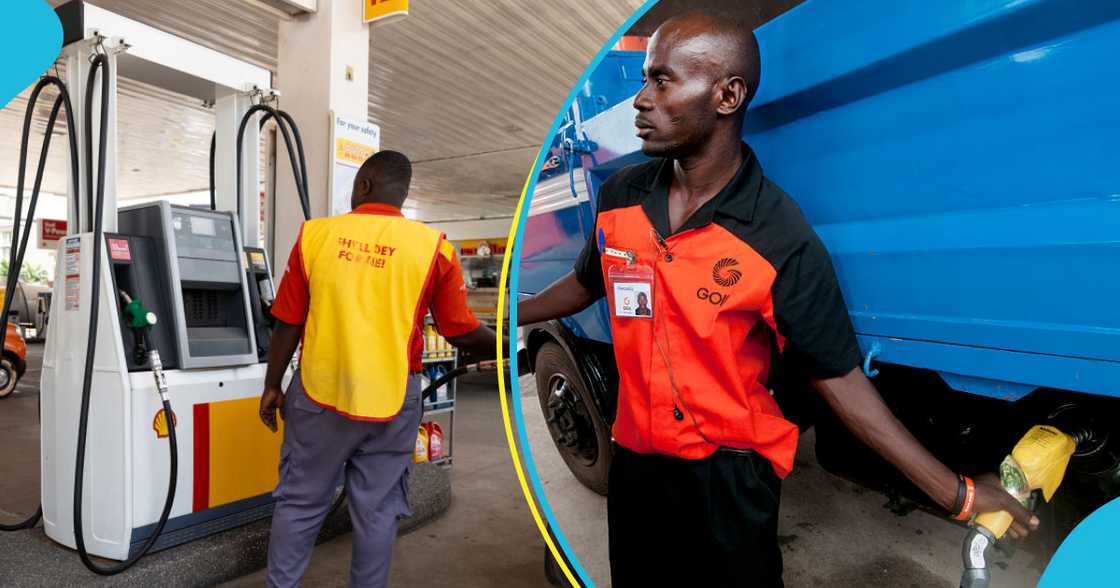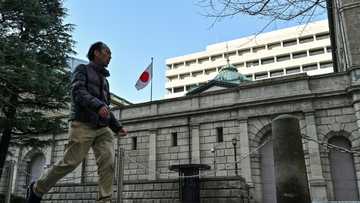Fuel Prices Drop For Third Consecutive Window But Analyst Raises Red Flag With Regulation
- Petrol, diesel, and liquefied petroleum gas prices have dropped for the third successive fuel pricing window
- The reductions are being attributed to falling crude oil prices on the international market and the recent relative stability of the cedi
- The Centre for Environmental Management and Sustainable Energy director, Benjamin Nsiah, raised concern with the rate of price decrease
Fuel prices have seen a drop from March 18, for the third consecutive pricing window.
The reductions are being attributed to falling crude oil prices on the international market and the recent relative stability of the cedi against the US dollar.

Source: Getty Images
However the rate of decrease has been a point of concern for some observers.
The Centre for Environmental Management and Sustainable Energy director, Benjamin Nsiah, noted to YEN.com.gh that the reductions being seen have left a lot to be desired.
“When you have an international price decline by about 9% and the cedi depreciated by 0.2% then it means ex-pump prices were expected to decline more than the 4.1% we are observing.”
"The bigger OMCs did not decrease their prices to even 4%. Some of them did around 3%. Some did 2.5%."
Nsiah said this called into question the extent of regulation by the National Petroleum Authority.
The Bank of Ghana sold $20 million in forex to Bulk Oil Distributing Companies in a 30-day forward auction that was held on March 12.
The forex rate for the auction was 15.5543 cedis to the dollar, which is below the spot exchange rate.
Nsiah explained that this should ideally be for the benefit of end users in Ghana because of the role the central bank plays in ensuring cheaper forex.
But these forex savings have not translated into relief for Ghanaians.
"They rather factor in the forward rate and because the forward rate takes care of the rate associated with depreciation, the forward rate is more expensive compared to the spot rate."
"The government is giving you the money because the government wants the end user to benefit from the money they are giving you.”
The solution to these challenges is better regulation and public interest enforcement from the National Petroleum Authority.
The National Petroleum Authority was established by an Act of Parliament (NPA Act 2005, ACT 691) to regulate the petroleum downstream industry in Ghana.
As a Regulator, the Authority ensures that the industry remains efficient, profitable, fair, and at the same time, ensures that consumers receive value for money.
The petroleum downstream sector in Ghana encompasses all activities involved in the importation and refining of crude oil as well as the sale, marketing, and distribution of refined petroleum products in the country.

Source: Getty Images
The various commercial activities of the industry include importation, exportation, re-exportation, shipment, transportation, processing, refining, storage, distribution, marketing, and sale of petroleum products. The industry is one of the key sub-sectors and a major contributor to Ghana's Gross Domestic Product (GDP).
The CEO of the National Petroleum Authority, Edudzi Tamakloe earlier assured consumers that measures are being implemented to stabilise fuel prices and mitigate the impact of future fluctuations.
Mahama government considers ECG privatisation
YEN.com.gh reported that the new government is considering privatising the Electricity Company of Ghana to address current inefficiencies in power distribution.
Mahama expressed these thoughts in a meeting with a World Bank delegation on January 8, 2025.
A previous attempt to privatise the Electricity Company of Ghana was made in 2019, with Power Distribution Services expected to manage the country's power distribution.
However, that agreement was terminated and described as fraudulent.
Proofreading by Samuel Gitonga, copy editor at YEN.com.gh.
Source: YEN.com.gh




